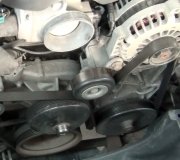There's a more accurate way to look at this. A stretched timing chain happens due to wear. The results of that stretching, in this case a jumped chain and mistimed camshafts can happen on any car that uses chains, then the issue is where was the vehicle when the problem occurred?
By far it is most common for a timing chain to jump a few teeth when the engine kicks back when being turned off and coasts to a stop. That means it runs fine up to the point it is stopped, then won't restart the next time. If that occurs when you stop for gas, you wouldn't blame it on the gas station. If it wouldn't restart when leaving work at the end of the day, you wouldn't blame it on the parking lot. If it occurred when leaving the grocery store or auto parts store, you wouldn't blame it on them.
The only thing that might make it more likely to occur during an oil change is some engines use chain or belt tensioning devices that use spring pressure that's very light, and back that up with hydraulic pressure from the engine oil. That pressure is low at start-up but gets up to normal pressure within a couple of seconds. If the oil change takes a long time, as in hours, some old oil can run out of the pickup tube and pump. That makes it take a few seconds longer to build pressure the first time the engine is started with that new oil. The issue here is the oil change is a normal occurrence and is not the cause of the problem, even though it might be involved. The real cause of the problem is the stretched chain, and that is not the fault of the person who did the oil change. In fact, nothing you listed could be caused unintentionally by the mechanic. If he had intentionally wanted to cause damage, he could not make the chain jump a tooth and he could not cause damage to a gear or sprocket without taking the engine apart.
If an improper procedure was the cause of the jumped chain, everyone with the same model and the same engine size would have the same worries, and we would have heard about this many times. We normally hear about stretched timing chains starting at around 150,000 miles, give or take a little. If the dealership mechanic believes the chain is stretched as early as 45,000 miles, there is either a severe lack of maintenance involved or a poor design. Given the opinions of other people, I'm inclined to lean toward a design issue, or simply a failed tensioning device. You must remember that mechanics are trained to diagnose and fix stuff. They are not trained on doing an in-depth analysis of all the factors involved that lead up to a failure. What they "tell" you is wrong, or happened, is their best guess. They don't know the whole story so they can't be expected to always know the sequence of events that led up to the eventual failure.
As proof of that incoherent comment, you were told two different stories by two different people. You know they both can't be right. You can't pick which story to believe just on the fact that one would be held responsible and have to pay for the repairs. I'm not a fan of the chain repair shops, but in this case there's nothing they could have done to cause the timing chain to stretch, and it's that stretched chain that led to the problems.
SPONSORED LINKS
Monday, January 4th, 2016 AT 3:20 PM



